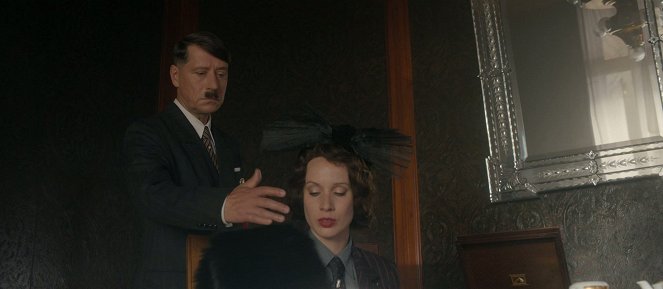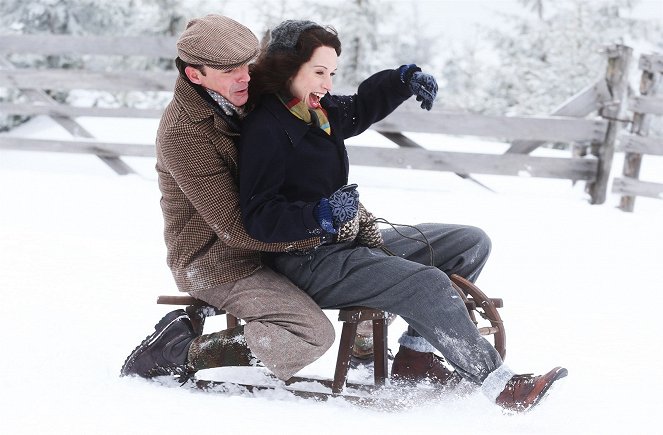Directed by:
Filip RenčScreenplay:
Ivan HubačCinematography:
Petr HojdaComposer:
Ondřej SoukupCast:
Táňa Pauhofová, Karl Markovics, Gedeon Burkhard, Zdenka Procházková, Simona Stašová, Martin Huba, Anna Fialová, Jiří Mádl, Lenka Vlasáková, Pavel Kříž (more)Plots(1)
One of the greatest untold love stories of the 20th century, this is the story of Lída Baarová, a beautiful Czech actress, who conquered Germany's silver screen as well as the heart of one of the Third Reich's most powerful men: the Minister of Propaganda, Joseph Goebbels. How could Hitler's chief ideologist fall in love with a non-Aryan Slavonic beauty whose race had been designated as inferior by the Führer in "Mein Kampf" and whose country was soon to be occupied by the Nazis? How could one of Europe's most glamorous actresses reject offers of stardom from Hollywood in preference to a dangerous romance with the Nazi monster with a deformed leg? The movie will shatter taboos and probe the thin red line between demonic ideology and passions of the heart. (official distributor synopsis)
(more)Videos (2)
Reviews (9)
Lída? Misery. Filip Renč simply doesn't make films for me, although unfortunately every now and then he picks a subject that I would be interested in. His Lída Baarová is only unintentionally funny most of the time. The actors, though well chosen in type, give virtually no performances (perhaps most evident in Hitler's "Do you like Wagner?" Pavel Kříž, who is not funny until he speaks for the first time, and Karl Markovics, who pretends to be a Robert De Niro impersonator most of the time and the dubbing of Viktor Preiss does not go down well with him at all), the script is stupid, either unnecessarily semi-opinionated, or again abbreviated to the point of shame, the viewer has no chance to even understand the main heroine, let alone judge her together with the young student in the finale... And where did that mammoth budget go? I don't really know, because the opening scene looks badly televised, like something out of Cops and Robbers. And it's not the last. The overall miserable impression is only added to by the unusually bizarre scenes like the "love" moment and the faces in flames or the complete ending with the lamp going out - nobody could have taken this seriously! I am only comforted by the fact that I was far from the only one in the cinema who laughed so often.
()
Seriously? How is it even possible that Filip Renč dared to release this? A question for him to ponder. The audience might, in turn, wonder if supporting such dreck by visiting the cinema even makes sense. The scene with the faces in flames perfectly highlights the direction in which Czech cinema is heading. Terrible.
()
When I went to the cinema to see the most anticipated Czech film of the year, I had both options in mind - that it would either be a hit or a dud, and Lída Baarová hovers precariously between both extremes. The life of one of the most beautiful Czech actresses of the 1930s offers some very dense material for a film, so there was, is and will be some potential here. I have to say that more could have been made of it, but I also have to admit that the film has some captivating and imaginative scenes. The desire for worldliness is often a stumbling block in Czech productions, even though success can be achieved in a nice Czech way, and that is why some sequences look too artificial and mechanical. A big plus for me was the intertwining of two timelines, which complemented each other well – I was also impressed by the voice-over of old Baarová, which was one of those moments when ripping off foreign films paid off. Personally, I was more taken with the second half, as the first, though nicely shot, was more protracted, while the second had more momentum and the tragic nature did its part as well. I won't comment on the use of German in the film, as it would be a long story, perhaps I can only add that in many American films foreigners mostly speak English, so why make such a big fuss over a Czech-speaking Hitler. Lída Baarová will probably not go down in the history of Czech cinema as a spectacular big film, but I don't want to unfairly cast aspersions, because there effort was there.
()
Let's leave aside the fact that the name "Lída Baarová" is no longer the name of an actress who lived from 1914 to 2000 and worked in Czechoslovakian, German, Austrian, Italian, and Spanish cinema, lived through all sorts of things, and then kept only theater at the end of her career. "Lída Baarová" has been an affair since Standa Motl entered her life and a social event since Filip Renč entered her fate. Renč's The Devil's Mistress is something of an intersection between Requiem for a Maiden and Guard No. 47, two moments in his career when Renč realized the power of film as a social event and the power of the period piece. This film amounts to cellophane tinsel that doesn't work, unfortunately. The artistic license is beyond believability and one searches in vain for qualities in certain aspects. On the other hand, personally, I don't really care. Films have been made about the likes of Anny Ondra since the 1970s, and thankfully no such hysteria has developed around either.
()
I can't help but like this film. It's not a clear statement about the fate of Lída Baarová; overall, it's conceived more as something that could have happened, but it could be distorted in itself. The Nazis are portrayed excellently here, and so the only thing that bothered me was that Táňa didn't fit with Lída Baarová at all.
()



Ads